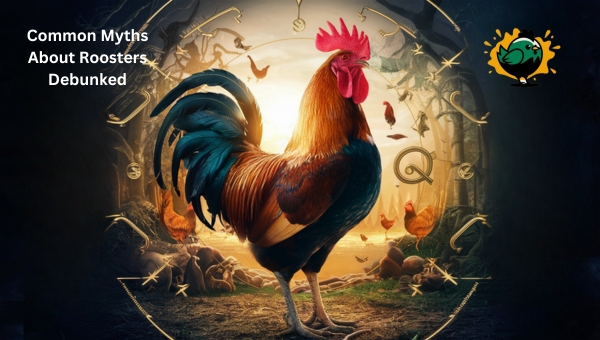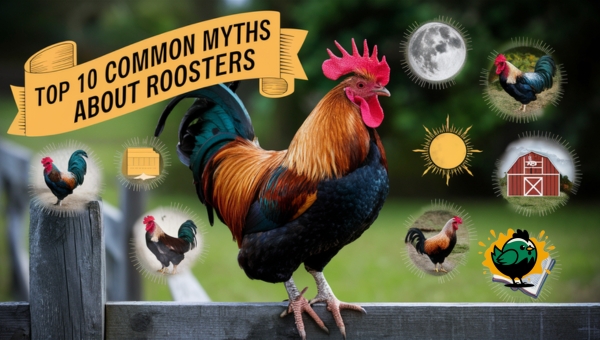10 Common Myths About Roosters Debunked

A quiet morning, the sun just peeking over the horizon, and the unmistakable crow of a rooster heralding the new day. For many, this sound conjures images of farm life and the belief that roosters are merely noisy alarm clocks.
However, there’s much more to these birds than meets the eye. In this article, we’ll uncover the truth behind ten common myths about roosters, shedding light on their true nature and dispelling widespread misconceptions. Let’s dive deep and explore the fascinating world of roosters together.
Top 10 Common Myths About Roosters
Here are the top 10 myths about roosters that often cloud our understanding of these remarkable birds.

1. Roosters Are Aggressive by Nature
Many believe that all roosters are naturally aggressive, but this isn’t entirely true. A rooster’s behavior is shaped by its environment and how it is treated.
While some roosters may show aggression, especially when they feel threatened or are competing for dominance, many can be quite friendly and social with proper care.
2. Roosters Are Necessary for Hens to Lay Eggs
A common misconception is that hens need a rooster to lay eggs. In reality, hens will lay eggs regardless of a rooster’s presence. The primary role of a rooster in a flock is to fertilize the eggs if chick production is desired. Otherwise, a rooster is not required for egg laying.
3. Roosters Crow Only at Dawn
It’s widely believed that roosters only crow at sunrise, but this is not the case. Roosters crow throughout the day for various reasons, such as signaling danger, establishing territory, or communicating with their flock. While they do often crow at dawn, it’s not their only vocal time.
4. All Roosters Look the Same
Roosters come in a wide variety of breeds, each with unique appearances and characteristics. Differences in feather colors, comb shapes, and sizes make each breed distinct. This variety adds beauty and interest to any flock, contradicting the belief that all roosters look alike.
5. Roosters Are Not Good Pets
Many people think roosters can’t be good pets, but this isn’t true. With proper handling and care, roosters can be docile and affectionate. They can form strong bonds with humans and be a delightful addition to a backyard flock.
6. You Can Only Have One Rooster Per Flock
The idea that only one rooster can exist in a flock without causing conflict is a myth. Multiple roosters can coexist peacefully if there are enough hens to go around and if the individual personalities of the roosters are compatible. Usually, having 8-10 hens per rooster helps maintain harmony.
7. Roosters Don’t Protect Their Flock
Roosters are often seen as the protectors of their flock. They have strong instincts to guard hens from potential threats and will alert the flock to danger. Their protective behavior includes crowing to signal alarm and even confronting predators if necessary.
8. Roosters Are Loud and Annoying All the Time
While roosters do crow, they are not constantly noisy. Their crowing habits vary and often occur during specific times or situations. Many owners find their vocalizations charming rather than disruptive.
9. Roosters Are Useless If You Don’t Want Chicks
Some believe that roosters serve no purpose without breeding. However, roosters play significant roles in flock management. They help protect the flock from predators and assist hens in finding food, contributing to the overall health and safety of the flock.
10. Roosters Attack Humans Without Reason
Rooster aggression towards humans is often misunderstood. They do not attack randomly; aggressive behavior usually stems from fear or perceived threats. Understanding their body language and providing proper handling can mitigate aggressive tendencies.
Also Read: Top Rare Chicken Breeds | A Must-See for Enthusiasts
FAQs
What should you do if your rooster becomes aggressive?
If your rooster shows aggression, remain calm and avoid sudden movements. Gently but firmly handle him to establish trust and dominance. Consistent training and socialization can help reduce aggressive behavior.
How can you tell if a rooster is protecting his flock or being territorial?
A rooster protecting his flock typically stays alert and makes warning sounds when sensing danger. If he’s being territorial, he may display aggressive postures or behaviors towards other roosters or intruders.
Do you need a rooster to fertilize eggs?
Yes, a rooster is needed to fertilize eggs for hatching chicks. However, hens will lay eggs regardless of a rooster’s presence, but those eggs will be unfertilized and cannot develop into chicks.
Conclusion
Understanding the common myths about roosters helps in better managing and appreciating these fascinating birds. Roosters are not inherently aggressive, nor are they necessary for egg production. They crow for various reasons, come in diverse breeds, and can make excellent pets. Multiple roosters can coexist, they protect their flocks, and their crowing is not as disruptive as believed.
Roosters offer more than just breeding value and do not attack humans without cause. By debunking these myths, we gain a clearer picture of their true nature and value. For more insightful articles about poultry and other fascinating topics, be sure to explore more on our site!
